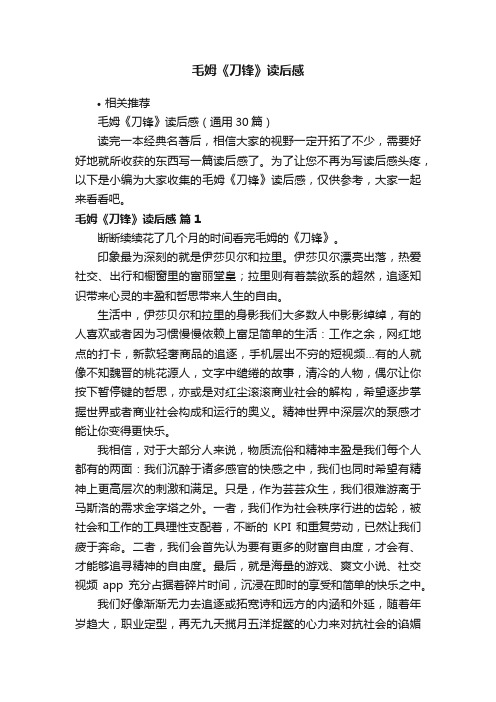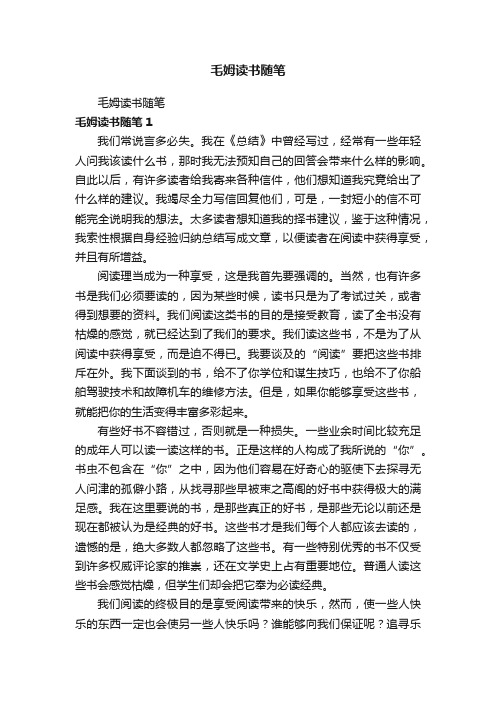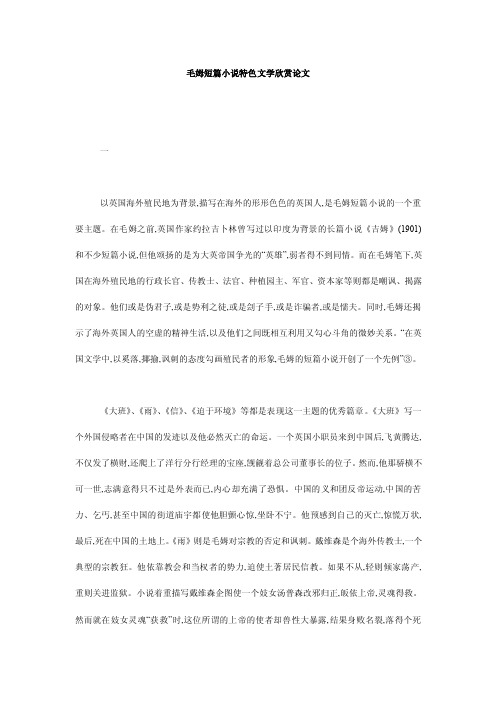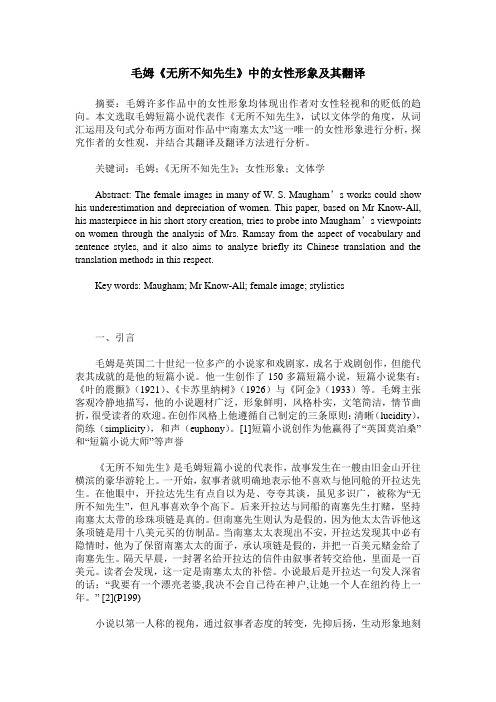毛姆短篇小说《无所不知先生》读后感
毛姆《刀锋》读后感

毛姆《刀锋》读后感•相关推荐毛姆《刀锋》读后感(通用30篇)读完一本经典名著后,相信大家的视野一定开拓了不少,需要好好地就所收获的东西写一篇读后感了。
为了让您不再为写读后感头疼,以下是小编为大家收集的毛姆《刀锋》读后感,仅供参考,大家一起来看看吧。
毛姆《刀锋》读后感篇1断断续续花了几个月的时间看完毛姆的《刀锋》。
印象最为深刻的就是伊莎贝尔和拉里。
伊莎贝尔漂亮出落,热爱社交、出行和橱窗里的富丽堂皇;拉里则有着禁欲系的超然,追逐知识带来心灵的丰盈和哲思带来人生的自由。
生活中,伊莎贝尔和拉里的身影我们大多数人中影影绰绰,有的人喜欢或者因为习惯慢慢依赖上富足简单的生活:工作之余,网红地点的打卡,新款轻奢商品的追逐,手机层出不穷的短视频…有的人就像不知魏晋的桃花源人,文字中缱绻的故事,清冷的人物,偶尔让你按下暂停键的哲思,亦或是对红尘滚滚商业社会的解构,希望逐步掌握世界或者商业社会构成和运行的奥义。
精神世界中深层次的泵感才能让你变得更快乐。
我相信,对于大部分人来说,物质流俗和精神丰盈是我们每个人都有的两面:我们沉醉于诸多感官的快感之中,我们也同时希望有精神上更高层次的刺激和满足。
只是,作为芸芸众生,我们很难游离于马斯洛的需求金字塔之外。
一者,我们作为社会秩序行进的齿轮,被社会和工作的工具理性支配着,不断的KPI和重复劳动,已然让我们疲于奔命。
二者,我们会首先认为要有更多的财富自由度,才会有、才能够追寻精神的自由度。
最后,就是海量的游戏、爽文小说、社交视频app充分占据着碎片时间,沉浸在即时的享受和简单的快乐之中。
我们好像渐渐无力去追逐或拓宽诗和远方的内涵和外延,随着年岁趋大,职业定型,再无九天揽月五洋捉鳖的心力来对抗社会的谄媚和冷漠。
我们匍匐在社会物欲的泥淖和森严秩序之下,在所有的获得和deadline之后才能喘息,进入片刻的贤者模式。
部分男性有着较为明确的指向,事业、养家和财务自由,可以有更多的推力和身段。
毛姆短篇小说《无所不知先生》读后感

毛姆短篇小说《无所不知先生》读后感Analysis of Mr. Know AllAbstract:W. Somerset Maugham was a well-known British novelist dramatist and essayist. Mr. Know All is one of his excellent short stories. This article tells mainly what had happened in Maugham’s short story Mr. Know All, the analyses of the main characters as well as the theme of the story and the techniques used by the author in creating the story.Key words: W. Somerset Maugham, human nature, demerit, bias, first impression摘要:威廉·萨默塞特·毛姆,英国著名小说家、戏剧家和散文家。
《无所不知先生》是其出色的短篇小说之一。
这篇文章主要从人物性格、主题以及写作手法方面对这篇小说进行分析。
关键词:威廉·萨默塞特·毛姆人性弱点偏见第一印象Mr. Know All is a famous short story by W. Somerset Maugham who was a famous British. His short stories mainly p ortrayed the British people’s life domestic and overseas. The ideas of escaping of the Western modern civilization and rebuilding of spiritual home, the pursuit of freedom and spiritual redemption found their vivid expression in most of his works. In the story Mr. Know All, the author created some figures full of flesh and blood by the vivid description of appearances, words and the unexpected plot. Like the narrator, Mr. Kelade and Mr. Ramsay. Through these remarkable distinctive figures he criticized the arrogance, vanity and selfishness in the human nature, specifically the narrator’s bia s and Mr. Kelade’s conceit and vulgarity. Additionally, he expressed the eagerness of Mr. Kelade to search for a sense of belonging.The story mainly tells about narrato r’s experience on an ona ocean going liner sailing from America to Japan on the Pacific Ocean. The narrator had to share a cabin with a stranger Max Kelada who was not a British as the narrator had expected him to be despite he indeed has a British passport. The reason why h e didn’t like Kelade was because in narrator’s eyes, he was talkative and conceited. He seemed to know everything and was involved in everything. No wonder he was disliked by everybody else on the ship. One evening during the dinner time, Mr. Kelada had a bet of a hundred dollar with Mr. Ramsay. He was quite sure that Mrs. Ramsay’s necklace was made by real pearls yet he claimed that he had made amistake. He was mocked by other people. While the next morning, Mr. Kelada received a note of a hundred, through which the narrator founded out that Mr. Kelada lost the wager deliberately because he knew that Mrs. Ramsay’s pearl necklace was brought by her lover and didn’t want to broke a family. At the end of the story, people may found that Mr. Kelada actually has some merits with him. Anyway he was a businessman who got very good personalities. He would rather lose his face and admit that he was wrong than tell Mr. Ramsay that his wife’s necklace was a real one. Thus the narrator’s prejudice against Mr. Kelade has disappeared.The narrator thought that he himself as a British was superior to those who were not British. He felt quite proud of his British nationality and behaved as a gentleman. At the very beginning, a biased and uneasy atmosphere reigned on this story, because the narrator said that he was prepared to dislike Max Kelada even before he knew him. As he has mentioned, “It was bad enough to share a cabin for fourteen days with anyone but I should have looked upon it with less dismay if my fellow passenger’s namehad been Smith or Brown.” He thought that anyone who add ressed a stranger should add a “mister” just as an English gentleman did. He took several examples to prove that how dislikable a person Mr. Kelada was. In the story he said, “I did not like Mr. Kelada. I not only shared a cabin with him and ate three meals a day at the same table, but I could not walk round the deck without his joining me. It was impossible to snub him. It never occurred to him that he was not wanted. He was certain that you were as glad to see him as he was to see you. In your house you might have kicked him down the stairs and slammed the door in his without the suspicion dawning on him that he was not a welcome guest.”Mr. Kelada was labeled a person of loquacity by the narrator, people may say it was just the narrator’s prejudice agains t him and they tried to examine Mr. Kelada with objectiveness. However from his behavior and words, people could found that he really didn’t leave people a good impres sion. He was chatty, arrogance and vanity. But as Jim Carrey once said in the movie Eternal Sunshine of the Spotless Mind(2004), “Constantly talking isn’t necessarily communicating.”For the most times, he was just expressing rather than communicating. It was irony enough that with all his loquacity, had never told anyone what his business was. He can know everyone on board in three days, yet most people disliked him and didn’t want totalk with him.Furthermore, he was conceited when talking with people, for instance, “he would not drop a subject, however unimportant, till he had brought you round to his way of thinking. The possibility that he could be mistaken never occurred to him.” When they talked about Mrs. Ramsay’s pearl necklace, again heboasted, “They’ll never be able to get a culture pearl that an expert like me can’t tell with hal f an eye.” He pointed to a chain that Mrs. Ramsay wore. “You take my word for it, Mrs. Ramsay, that chain you’re wearing will never be worth a cent less than it is now.”When it came to his vanity, it has been exposed to the full. Firstly, it was quite ironic that people called him Mr. Know All, even to his face yet he took it as a compliment. Secondly, judging from his choice of words, Mr. Kelada appeared to be very artificial. “I was jolly glad when I heard you were English.” He said when he greeted his roommate. Instead of using “very glad”, he chose an old-fashion English word “jolly”, which was usually used by the noble. Moreover, when he offered some wine to the narr ator he said, “Well, there are plenty more where that came from, and if you’ve got any friends on board, you tell them you’ve got a pal who’s got all the liquor in the world.”No matter through the narrator or judged by the readers themselves, obviously, all that readers knew about him was merely his loquacity and kindness. Actually in his deep soul, he wanted so badly to be accepted by other groups of people, especially by the native British people. His appearance, words and behavior showed that he was not a British people in born but a native of one of the British colonies. The reason why he appeared to be extremely talkative and vehement was that he wanted to be with other people and find a sense of belonging. His country turned to the colony of the Britain, therefore it has lost its sovereignty, and so did its people. They have no dignity. Maybe they simply wanted to find something that could make them equal to these British colonizers. He chatted with almost everyone on every topic to prove how great he was and put someair on him.In this short story, irony, contrast and foreshadowing were applied in shaping the characters and developing the plot. Basically, instead of presenting his feelings towards the characters directly, the author used objective facts, the incisive, vivid and unique artistic description to give the readers space to have ideas of their own. Take some sentences fromthe story as illustrations, “I fell pretty sure that a closer inspection of that British passport would have betrayed the fact that Mr. Kelada was born under a bluer sky than is generally seen in England.” These words came from the narrator. He didn’t directly point out that Mr. Kelada was not a British people, but used “A bluer sky” to make it humorous and ironic. The autho r used a large amount of dialogues to interpret Mr. Kelada’s arrogance and loquacity with a view to form a contrast with his considerate and sympathy to Mrs. Ramsay.It was not difficult to find that foreshadowing existed in this story that indicated what would happen later. For example, the description of Mr. Kelada’s luggage was actually the indication of his social status and his background. His luggage contained many staffs: excellent Monsieur Coty, and brushes ebonized with his monogram in gold. These indicated that he was an experienced man and with some money. In addition, he ran everything. He was everywhere and always. He liked to deal with all kind of people, when he saw Mrs. Ramsay’s necklace, he recognized it immediately and pretty sure it was made by real pearls. Needless to say he dared to have a wager with Mr. Ramsay. But when he saw Mrs. Ramsay’s wide and terrified eyes, he said he was mistaken. It was also an indication that Mrs. Ramsay’s necklace was really valuable, he was a good person at the end ofthe story.After finished this short story, it was worth mentioning several points concerning the theme of the story. At first, there is something about the first impression. Mr. Kelada has lived an impression of a proud, chatty and philistine businessman. Indeed he has his weaknesses and limitations, but there were something shining points in his character, that is he has a heart of kindness which can not be seen easily but can win people’s respect. He was a person with distinction, not for his knowledge, but his personalities. This may inform the readers not to judge a person simply by his appearance and they would easily be tricked. One thing was clear, only by getting along with someone can you truly understand him.Besides, cultural difference needed to be taken into consideration. Mr. Kelada thought that his hospitality was an effective way to deal with a stranger, but it was turned out to be useless. British people like the narrator viewed it as an offense. Actually they didn’t like to be forced into a conversation. In the narrator’s concepts a gentleman should be modest instead of conceited, should be quiet during meals rather than voluble, and should be courtesy. Since they had quite different backgrounds, undoubtedly, there were misunderstandings and biases existed.In brief, by a concise description of words and behavior, this story depicted several remarkable figures from different backgrounds and by creating these characters the author exposed all the demerits, ugliness and imperfection in human nature. He also figured out some root of these demerits and imperfection, that is, human being’s inevitable bias and cultural difference. The author criticized the complicated human nature,called for a discarding of ugliness and cried for a pitiful eagerness to find a sense of belonging. The most important thing was people should not jump to a conclusion before one really knew someone.Bibliography:[1]孙妮,《毛姆短篇小说艺术特色浅论》,《安徽师大学报》(哲学社会科学版) 第25 卷(1997) 第3 期[2] Hastings, Selina, 2009 The Secret Lives of Somerset Maugham - A biography. London, John Murray.[3]/doc/413496042.html,/knowall/[4]/doc/413496042.html,/famous/857 /[5]/doc/413496042.html,/wiki/W._So merset_Maugham。
毛姆《人性的枷锁》读后感(19篇)

毛姆《人性的枷锁》读后感(19篇)毛姆《人性的枷锁》读后感篇1喜爱上读书,才开头真正体会到生活的奇妙,并感觉到自己精神上的成长。
奥地利作家茨威格说过:“一个人和书籍接触得愈亲热,他便愈加深刻地感到生活的统一,由于他的人格复化了:他不仅用他自己的眼睛观看,而且运用着很多心灵的眼睛,由于他们这种崇高的关心,他将怀着挚爱的怜悯踏遍完全的世界。
”这几天读完同事推举毛姆的《人性的枷锁》,深刻领悟到了这一点。
乍看厚厚的一本,八百多页,还怕会读不下去,没想到开头读后,竟再也不忍释卷。
书中的文字,句句都似在写着自己的内心。
我也因了的笔墨,将自己全然投入进了仆人公菲利普的世界。
那些天每有所思,脑海里全是那跛足少年。
当他虔诚地祈祷上帝治愈他的残疾时,为显示诚意他有意让自己吃苦,想象着自己被治愈后美好欢乐的样子,想象着原先嘲讽他的人是怎样目瞪口呆……此时,我真想去拥抱这个和善纯朴的少年,这不就是当年的我吗?小时候,自己也曾因过于羞涩,老是沉醉于自己的缺点,而不敢回答下列问题,不懂得与同学相处。
尽管外表静默寡言,内心却把自己想象成班里最棒的那位同学,甚至于暗地里仿照她的一言一行,成天如白日梦般遐思,还经常为自己想象出来的美好吃吃傻笑。
少年菲利普不断遭人嘲弄,渐渐失却了孩提的天真,进而苦痛地意识到自身的存在。
哪个少年不是在自身的苦恼中成长起来的?“菲利普看了好多书,脑子里塞满了各种各样的念头,正由于他对书里讲的事理只是一知半解,这反倒为他的想象力开阔了驰骋的天地。
在他苦痛的羞态背后,在他的心灵深处,某种东西却在渐渐成形,他迷模糊糊地意识到了自己的独特。
”读书使人成长。
在书中列了大量仆人公在不同阶段读的书,这些书中的思想和他四周人物的思想都在影响着他。
“一个人仿佛是一个包得紧紧的蓓蕾。
一个人所读的书或所做的事,在大多数状况下,对他毫无作用。
然而,有些事情对一个人来说的确具有一种特别意义,这些具有特别意义的事情使得蓓蕾开放一片花瓣,花瓣一片片接连开放,最终便开成一朵鲜花。
毛姆读书随笔

毛姆读书随笔毛姆读书随笔毛姆读书随笔1我们常说言多必失。
我在《总结》中曾经写过,经常有一些年轻人问我该读什么书,那时我无法预知自己的回答会带来什么样的影响。
自此以后,有许多读者给我寄来各种信件,他们想知道我究竟给出了什么样的建议。
我竭尽全力写信回复他们,可是,一封短小的信不可能完全说明我的想法。
太多读者想知道我的择书建议,鉴于这种情况,我索性根据自身经验归纳总结写成文章,以便读者在阅读中获得享受,并且有所增益。
阅读理当成为一种享受,这是我首先要强调的。
当然,也有许多书是我们必须要读的,因为某些时候,读书只是为了考试过关,或者得到想要的资料。
我们阅读这类书的目的是接受教育,读了全书没有枯燥的感觉,就已经达到了我们的要求。
我们读这些书,不是为了从阅读中获得享受,而是迫不得已。
我要谈及的“阅读”要把这些书排斥在外。
我下面谈到的书,给不了你学位和谋生技巧,也给不了你船舶驾驶技术和故障机车的维修方法。
但是,如果你能够享受这些书,就能把你的生活变得丰富多彩起来。
有些好书不容错过,否则就是一种损失。
一些业余时间比较充足的成年人可以读一读这样的书。
正是这样的人构成了我所说的“你”。
书虫不包含在“你”之中,因为他们容易在好奇心的驱使下去探寻无人问津的孤僻小路,从找寻那些早被束之高阁的好书中获得极大的满足感。
我在这里要说的书,是那些真正的好书,是那些无论以前还是现在都被认为是经典的好书。
这些书才是我们每个人都应该去读的,遗憾的是,绝大多数人都忽略了这些书。
有一些特别优秀的书不仅受到许多权威评论家的推崇,还在文学史上占有重要地位。
普通人读这些书会感觉枯燥,但学生们却会把它奉为必读经典。
我们阅读的终极目的是享受阅读带来的快乐,然而,使一些人快乐的东西一定也会使另一些人快乐吗?谁能够向我们保证呢?追寻乐趣并非是不道德的行为。
乐趣本身有什么不好呢?聪明人之所以放弃对一些乐趣的追求,不是因为讨厌乐趣,只能在感官享受层面停留下来,而是因为追求乐趣有时候也会导致一些不好的后果。
毛姆短篇小说特色文学欣赏论文

毛姆短篇小说特色文学欣赏论文一以英国海外殖民地为背景,描写在海外的形形色色的英国人,是毛姆短篇小说的一个重要主题。
在毛姆之前,英国作家约拉吉卜林曾写过以印度为背景的长篇小说《吉姆》(1901)和不少短篇小说,但他颂扬的是为大英帝国争光的“英雄”,弱者得不到同情。
而在毛姆笔下,英国在海外殖民地的行政长官、传教士、法官、种植园主、军官、资本家等则都是嘲讽、揭露的对象。
他们或是伪君子,或是势利之徒,或是刽子手,或是诈骗者,或是懦夫。
同时,毛姆还揭示了海外英国人的空虚的精神生活,以及他们之间既相互利用又勾心斗角的微妙关系。
“在英国文学中,以奚落,揶揄,讽刺的态度勾画殖民者的形象,毛姆的短篇小说开创了一个先例”③。
《大班》、《雨》、《信》、《迫于环境》等都是表现这一主题的优秀篇章。
《大班》写一个外国侵略者在中国的发迹以及他必然灭亡的命运。
一个英国小职员来到中国后,飞黄腾达,不仅发了横财,还爬上了洋行分行经理的宝座,觊觎着总公司董事长的位子。
然而,他那骄横不可一世,志满意得只不过是外表而已,内心却充满了恐惧。
中国的义和团反帝运动,中国的苦力、乞丐,甚至中国的街道庙宇都使他胆颤心惊,坐卧不宁。
他预感到自己的灭亡,惊慌万状,最后,死在中国的土地上。
《雨》则是毛姆对宗教的否定和讽刺。
戴维森是个海外传教士,一个典型的宗教狂。
他依靠教会和当权者的势力,迫使土著居民信教。
如果不从,轻则倾家荡产,重则关进监狱。
小说着重描写戴维森企图使一个妓女汤普森改邪归正,皈依上帝,灵魂得救。
然而就在妓女灵魂“获救”时,这位所谓的上帝的使者却兽性大暴露,结果身败名裂,落得个死无葬身之地的下场。
戴维森的可悲结局揭示了宗教的伪善和虚无,是束缚人性的枷锁。
中篇小说《信》揭露出资产阶级法律的虚伪性。
主人公橡胶园主罗伯特克罗斯比的妻子莱斯利因涉及一桩凶杀案而被捕。
莱斯利的辩护律师乔伊斯在明知莱斯利是杀人凶手的情况,却处心积虑地为她辩护,收买证据,从而使莱斯利无罪释放。
毛姆的读后感

毛姆的读后感在读完毛姆的作品后,我深感启发和思考。
毛姆的作品以其独特的散文风格和深入人心的主题而闻名,给我留下了深刻的印象。
以下是我对毛姆的作品的读后感。
首先,毛姆作品中最吸引我的是他对人性的描绘。
不同于其他作家,毛姆将目光聚焦在人性的复杂和矛盾之处。
他通过细致入微的描写,将人物形象栩栩如生地展现在读者面前。
无论是那些寻求自由的探险家还是被社会禁锢束缚的主妇,都展现了人性深处的真实感情和激情。
毛姆的作品使我认识到人性的多样性和复杂性,让我思考人与人之间的相互作用以及个体内部的挣扎。
其次,毛姆作品中的情感表达令人难忘。
他以细腻的笔触和深情的叙述,将情感注入到文字中,让读者能够感受到作品中的痛苦、喜悦、迷茫和幸福。
毛姆的作品中充盈着对人类情感世界的探索,他通过作品传达出对爱、婚姻、友谊和孤独的深刻思考。
读完毛姆的作品,我内心被触动,深深沉浸在其中的情感世界。
第三,毛姆通过作品中的智慧和思考引导读者思考人类存在的意义和价值。
他关注生命的意义,在作品中探讨人的欲望、追求和成长。
他以细腻而真实的描述,揭示人类内心最深处的渴望和追求。
毛姆的作品使我重新审视人生的价值观,让我思考个人选择对于人生道路的影响以及内心的追求和满足。
总结起来,毛姆的作品给予我很多启发和思考。
通过他细致入微的人性描写、情感表达和对人类存在的思考,我得以深入思考生活的意义和自己的追求。
读完毛姆的作品,我对人性和情感有了更深入的理解,也在文学艺术中找到了一种独特的沟通和启迪。
我相信,毛姆的作品将继续影响和感染更多的读者,带给他们思考与感悟的机会。
人性的枷锁读后感6篇

人性的枷锁读后感人性的枷锁读后感6篇《人性的枷锁》小说叙述了主人公菲利普从童年时代起在家庭、学校和社会的三十年的生活经历,反映了主人公成长过程中的迷惘、挫折、痛苦、失望和探索及其所受到的身体缺陷、宗教和情欲的束缚,以及主人公最后摆脱这些枷锁的成长历程。
以下是小编整理的读后感,希望对大家有帮助!人性的枷锁读后感1书名为人性的枷锁,我也看到它的另一个翻译叫人生的枷锁,在我看来,人性的枷锁这个翻译似乎有点不妥,纵观全书,我就一直在思考,这个枷锁到底是什么?故事近半我才察觉到,人性没有枷锁,因为人性才是真正的那个枷锁!人性,即人的本性,是数万年来慢慢形成的,进化论告诉我们,现代人的一个最主要的任务便是克服根植在人类基因里的思维方式,生活习惯,现代思维就需要我们和人的本能作斗争。
作者以菲利普的视角为我们解锁了一个又一个在人的各个阶段所遇到的人,面临的任务。
孩提时代,菲利普因为残疾,父母双亡,受到旁人异样的目光,无数的嘲讽,从此他渐渐变得内敛,或许我们中的大多数人若是遇到这样的童年,或许就会自暴自弃到老,继而在这个世界了此残生,索性菲利普看到了新世界的大门,爱上了阅读,让他觉得生活并没有那么糟糕,之前自己的'内心世界是有所依托的!这或许是挣脱枷锁的第一步。
虽然在校成绩优异,毅然决然放弃当牧师,前往德国学习,即便不知道前方会有多少艰难险阻。
我年轻,我的人生还很长,我有的是试错的资本!这便是挣脱枷锁的第二步。
在德国,遇到了有一颗文艺青年的心,却无人生大志向的海沃德,让年幼的他认识到外面的斑斓世界,本就不安分的内心,变得更加狂野。
回到英国,有认识到了大自己好多岁的女人,恩恩怨怨纠缠甚久,让初尝禁果的他渐渐期盼一场刻骨铭心的恋爱!巴黎学艺术,遇到了穷困潦倒的女同学,后来因为生计问题,无奈选择了自尽,让他意识到追求理想当然可以,但是少了物质基础一切免谈!年轻的时候,不要想着安逸,出去闯闯,出去看看这个大千世界,渐渐的让自己的三观丰满起来。
毛姆《无所不知先生》中的女性形象及其翻译

毛姆《无所不知先生》中的女性形象及其翻译摘要:毛姆许多作品中的女性形象均体现出作者对女性轻视和的贬低的趋向。
本文选取毛姆短篇小说代表作《无所不知先生》,试以文体学的角度,从词汇运用及句式分布两方面对作品中“南塞太太”这一唯一的女性形象进行分析,探究作者的女性观,并结合其翻译及翻译方法进行分析。
关键词:毛姆;《无所不知先生》;女性形象;文体学Abstract: The female images in many of W. S. Maugham’s works could show his underestimation and depreciation of women. This paper, based on Mr Know-All, his masterpiece in his short story creation, tries to probe into Maugham’s viewpoints on women through the analysis of Mrs. Ramsay from the aspect of vocabulary and sentence styles, and it also aims to analyze briefly its Chinese translation and the translation methods in this respect.Key words: Maugham; Mr Know-All; female image; stylistics一、引言毛姆是英国二十世纪一位多产的小说家和戏剧家,成名于戏剧创作,但能代表其成就的是他的短篇小说。
他一生创作了150多篇短篇小说,短篇小说集有:《叶的震颤》(1921)、《卡苏里纳树》(1926)与《阿金》(1933)等。
毛姆主张客观冷静地描写,他的小说题材广泛,形象鲜明,风格朴实,文笔简洁,情节曲折,很受读者的欢迎。
- 1、下载文档前请自行甄别文档内容的完整性,平台不提供额外的编辑、内容补充、找答案等附加服务。
- 2、"仅部分预览"的文档,不可在线预览部分如存在完整性等问题,可反馈申请退款(可完整预览的文档不适用该条件!)。
- 3、如文档侵犯您的权益,请联系客服反馈,我们会尽快为您处理(人工客服工作时间:9:00-18:30)。
Analysis of Mr. Know AllAbstract:W. Somerset Maugham was a well-known British novelist dramatist and essayist. Mr. Know All is one of his excellent short stories. This article tells mainly what had happened in Maugham’s short story Mr. Know All, the analyses of the main characters as well as the theme of the story and the techniques used by the author in creating the story.Key words: W. Somerset Maugham, human nature, demerit, bias, first impression摘要:威廉·萨默塞特·毛姆,英国著名小说家、戏剧家和散文家。
《无所不知先生》是其出色的短篇小说之一。
这篇文章主要从人物性格、主题以及写作手法方面对这篇小说进行分析。
关键词:威廉·萨默塞特·毛姆人性弱点偏见第一印象Mr. Know All is a famous short story by W. Somerset Maugham who was a famous British. His short stories mainly portrayed the British people’s life domestic and overseas. The ideas of escaping of the Western modern civilization and rebuilding of spiritual home, the pursuit of freedom and spiritual redemption found their vivid expression in most of his works. In the story Mr. Know All, the author created some figures full of flesh and blood by the vivid description of appearances, words and the unexpected plot. Like the narrator, Mr. Kelade and Mr. Ramsay. Through these remarkable distinctive figures he criticized the arrogance, vanity and selfishness in the human nature, specifically the narrator’s bia s and Mr. Kelade’s conceit and vulgarity. Additionally, he expressed the eagerness of Mr. Kelade to search for a sense of belonging.The story mainly tells about narrator’s experience on an on a ocean going liner sailing from America to Japan on the Pacific Ocean. The narrator had to share a cabin with a stranger Max Kelada who was not a British as the narrator had expected him to be despite he indeed has a British passport. The reason why h e didn’t like Kelade was because in narrator’s eyes, he was talkative and conceited. He seemed to know everything and was involved in everything. No wonder he was disliked by everybody else on the ship. One evening during the dinner time, Mr. Kelada had a bet of a hundred dollar with Mr. Ramsay. He was quite sure that Mrs. Ramsay’s necklace was made by real pearls yet he claimed that he had made amistake. He was mocked by other people. While the next morning, Mr. Kelada received a note of a hundred, through which the narrator founded out that Mr. Kelada lost the wager deliberately because he knew that Mrs. Ramsay’s pearl necklace was brought by her lover and didn’t want to broke a family. At the end of the story, people may found that Mr. Kelada actually has some merits with him. Anyway he was a businessman who got very good personalities. He would rather lose his face and admit that he was wrong than tell Mr. Ramsay that his wife’s necklace was a real one. Thus the narrator’s prejudice against Mr. Kelade has disappeared.The narrator thought that he himself as a British was superior to those who were not British. He felt quite proud of his British nationality and behaved as a gentleman. At the very beginning, a biased and uneasy atmosphere reigned on this story, because the narrator said that he was prepared to dislike Max Kelada even before he knew him. As he has mentioned, “It was bad enough to share a cabin for fourteen days with anyone but I should have looked upon it with less dismay if my fellow passenger’s name had been Smith or Brown.” He thought that anyone who add ressed a stranger should add a “mister” just as an English gentleman did. He took several examples to prove that how dislikable a person Mr. Kelada was. In the story he said, “I did not like Mr. Kelada. I not only shared a cabin with him and ate three meals a day at the same table, but I could not walk round the deck without his joining me. It was impossible to snub him. It never occurred to him that he was not wanted. He was certain that you were as glad to see him as he was to see you. In your house you might have kicked him down the stairs and slammed the door in his without the suspicion dawning on him that he was not a welcome guest.”Mr. Kelada was labeled a person of loquacity by the narrator, people may say it was just the narrator’s prejudice agains t him and they tried to examine Mr. Kelada with objectiveness. However from his behavior and words, people could found that he really didn’t leave people a good impression. He was chatty, arrogance and vanity. But as Jim Carrey once said in the movie Eternal Sunshine of the Spotless Mind(2004), “Constantly talking isn’t necessarily communicating.”For the most times, he was just expressing rather than communicating. It was irony enough that with all his loquacity, had never told anyone what his business was. He can know everyone on board in three days, yet most people disliked him and didn’t want totalk with him.Furthermore, he was conceited when talking with people, for instance, “he would not drop a subject, however unimportant, till he had brought you round to his way of thinking. The possibility that he could be mistaken never occurred to him.” When they talked about Mrs. Ramsay’s pearl necklace, again he boasted, “They’ll never be able to get a culture pearl that an expert like me can’t tell with hal f an eye.” He pointed to a chain that Mrs. Ramsay wore. “You take my word for it, Mrs. Ramsay, that chain you’re wearing will never be worth a cent less than it is now.”When it came to his vanity, it has been exposed to the full. Firstly, it was quite ironic that people called him Mr. Know All, even to his face yet he took it as a compliment. Secondly, judging from his choice of words, Mr. Kelada appeared to be very artificial. “I was jolly glad when I heard you were English.” He said when he greeted his roommate. Instead of using “very glad”, he chose an old-fashion English word “jolly”, which was usually used by the noble. Moreover, when he offered some wine to the narrator he said, “Well, there are plenty more where that came from, and if you’ve got any friends on board, you tell them you’ve got a pal who’s got all the liquor in the world.”No matter through the narrator or judged by the readers themselves, obviously, all that readers knew about him was merely his loquacity and kindness. Actually in his deep soul, he wanted so badly to be accepted by other groups of people, especially by the native British people. His appearance, words and behavior showed that he was not a British people in born but a native of one of the British colonies. The reason why he appeared to be extremely talkative and vehement was that he wanted to be with other people and find a sense of belonging. His country turned to the colony of the Britain, therefore it has lost its sovereignty, and so did its people. They have no dignity. Maybe they simply wanted to find something that could make them equal to these British colonizers. He chatted with almost everyone on every topic to prove how great he was and put some air on him.In this short story, irony, contrast and foreshadowing were applied in shaping the characters and developing the plot. Basically, instead of presenting his feelings towards the characters directly, the author used objective facts, the incisive, vivid and unique artistic description to give the readers space to have ideas of their own. Take some sentences fromthe story as illustrations, “I fell pretty sure that a closer inspection of that British passport would have betrayed the fact that Mr. Kelada was born under a bluer sky than is generally seen in England.” These words came from the narrator. He didn’t directly point out that Mr. Kelada was not a British people, but used “A bluer sky” to make it humorous and ironic. The author used a large amount of dialogues to interpret Mr. Kelada’s arrogance and loquacity with a view to form a contrast with his considerate and sympathy to Mrs. Ramsay.It was not difficult to find that foreshadowing existed in this story that indicated what would happen later. For example, the description of Mr. Kelada’s luggage was actually the indication of his social status and his background. His luggage contained many staffs: excellent Monsieur Coty, and brushes ebonized with his monogram in gold. These indicated that he was an experienced man and with some money. In addition, he ran everything. He was everywhere and always. He liked to deal with all kind of people, when he saw Mrs. Ramsay’s necklace, he recognized it immediately and pretty sure it was made by real pearls. Needless to say he dared to have a wager with Mr. Ramsay. But when he saw Mrs. Ramsay’s wide and terrified eyes, he said he was mistaken. It was also an indication that Mrs. Ramsay’s necklace was really valuable, he was a good person at the end of the story.After finished this short story, it was worth mentioning several points concerning the theme of the story. At first, there is something about the first impression. Mr. Kelada has lived an impression of a proud, chatty and philistine businessman. Indeed he has his weaknesses and limitations, but there were something shining points in his character, that is he has a heart of kindness which can not be seen easily but can win people’s respect. He was a person with distinction, not for his knowledge, but his personalities. This may inform the readers not to judge a person simply by his appearance and they would easily be tricked. One thing was clear, only by getting along with someone can you truly understand him.Besides, cultural difference needed to be taken into consideration. Mr. Kelada thought that his hospitality was an effective way to deal with a stranger, but it was turned out to be useless. British people like the narrator viewed it as an offense. Actually they didn’t like to be forced into a conversation. In the narrator’s concepts a gentleman should be modest instead of conceited, should be quiet during meals rather than voluble, and should be courtesy. Since they had quite different backgrounds, undoubtedly, there were misunderstandings and biasesexisted.In brief, by a concise description of words and behavior, this story depicted several remarkable figures from different backgrounds and by creating these characters the author exposed all the demerits, ugliness and imperfection in human nature. He also figured out some root of these demerits and imperfection, that is, human being’s inevitable bias and cultural difference. The author criticized the complicated human nature, called for a discarding of ugliness and cried for a pitiful eagerness to find a sense of belonging. The most important thing was people should not jump to a conclusion before one really knew someone.Bibliography:[1]孙妮,《毛姆短篇小说艺术特色浅论》,《安徽师大学报》(哲学社会科学版) 第25 卷(1997) 第3 期[2] Hastings, Selina, 2009 The Secret Lives of Somerset Maugham - A biography. London, John Murray.[3]/knowall/[4]/famous/857/[5]/wiki/W._Somerset_Maugham。
